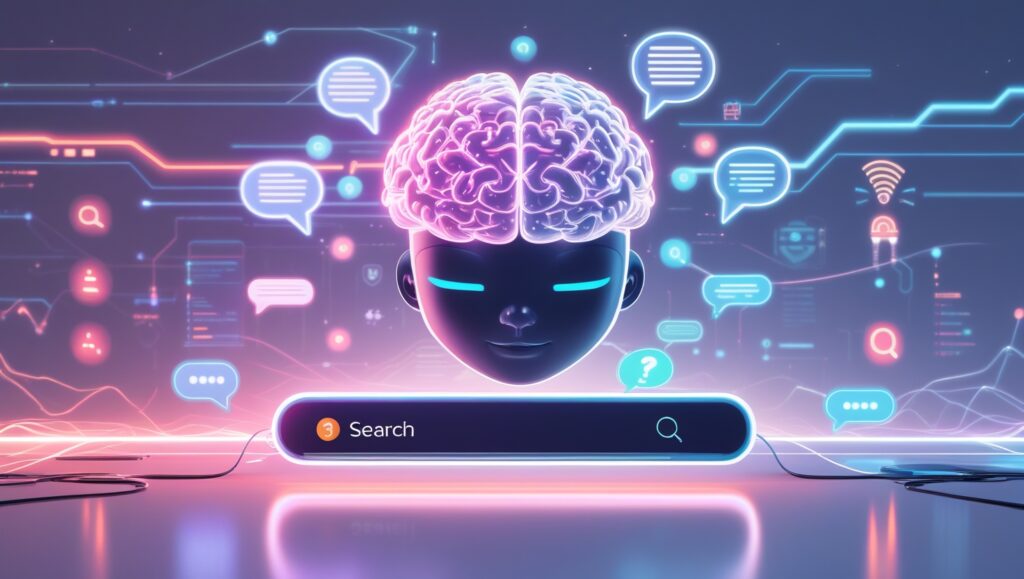Ask Artificial Intelligence: What It Means and Why It’s Replacing Search
Why Are We Asking AI Instead of Searching?
There’s a quiet revolution happening in how we search for information — and most people don’t even realize it’s already begun.
Not too long ago, you’d turn to Google and scroll through ten links, ads, and maybe a few Reddit threads. Today? Millions of people are skipping Google entirely — and simply asking artificial intelligence instead.
Whether it’s ChatGPT, Gemini, Perplexity, or Claude, AI tools are transforming how we discover, decide, and get things done.
They’re faster, smarter, and often more accurate than traditional search engines — offering direct answers instead of just showing links.
In this post, we’ll explore:
What it really means to “ask AI”
How AI search works (and why it’s different)
What people are actually asking artificial intelligence
The best tools to do it with
And how creators and businesses can position their content to be the answer AI shows users
If you’re a business owner, a content creator, or just someone who wants to be seen online — this guide will future-proof your strategy.
Table of Contents
What Does It Mean to Ask Artificial Intelligence?
How AI Is Changing the Way We Search
ChatGPT, Gemini & Perplexity: The New Answer Engines
Real Examples: What People Ask AI Today
Best Tools to Ask AI Smarter (2025 Edition)
How to Optimize Your Content to Be the AI Answer
FAQs About Asking Artificial Intelligence
Final Thoughts & Links to More AEO Resources
What Does It Mean When You Ask Artificial Intelligence for Answers?
Asking artificial intelligence means skipping traditional keyword-based search engines and directly engaging with an AI model to get answers, ideas, summaries, or instructions.
AI understands natural language, interprets intent, and generates a response — often within seconds.
Examples:
“Summarize the benefits of vitamin D.”
“Write me a catchy LinkedIn headline.”
“Give me the pros and cons of starting an eCommerce business.”
This shift is redefining the concept of search itself.
 How AI Is Changing the Way We Search
How AI Is Changing the Way We Search
Traditional search:
Based on keywords
Delivers a list of links
Requires users to interpret the data
AI search:
Based on intent and context
Generates direct, conversational answers
Refines its answers as you engage
This is why Google launched Gemini, and platforms like Perplexity and You.com are thriving — users now want answers, not pages.
 ChatGPT, Gemini & Perplexity: The New Answer Engines
ChatGPT, Gemini & Perplexity: The New Answer Engines
Here’s how the new AI search tools compare:
| Tool | Strengths |
|---|---|
| ChatGPT | Creative writing, long-form answers |
| Gemini | Integration with Google’s ecosystem |
| Perplexity | Fast, source-linked answers |
| Claude | Polished language, research summaries |
AI is now your assistant, not your browser.
Examples: What People Are Asking AI Today
In Health
“What’s the difference between omega-3 and omega-6?”
“Is keto diet safe for diabetics?”
In Business
“Generate a cold email for digital marketing services.”
“Summarize this investor deck in bullet points.”
In Life
“Write a breakup text that’s kind but clear.”
“Give me gift ideas for my wife’s 30th birthday.”

 Tools to Ask AI Smarter (2025 Edition)
Tools to Ask AI Smarter (2025 Edition)
ChatGPT (OpenAI)
Gemini (Google)
Claude (Anthropic)
Perplexity.ai
You.com
Meta AI (WhatsApp)
Each of these tools interprets questions differently — some are better for research, others for summarizing or creating content.

 How to Optimize Your Content to Be the AI Answer
How to Optimize Your Content to Be the AI Answer
This is where AEO (Ask Engine Optimization) comes in. If you want your content to be quoted, referenced, or summarized by AI, here’s what you need to do:
Write answers, not fluff
Use clear headings and lists
Add FAQ sections
Use schema markup (Speakable, FAQPage)
Structure your data for voice-readiness

 FAQs: How to Ask Artificial Intelligence and Get Better Answers
FAQs: How to Ask Artificial Intelligence and Get Better Answers
Can I ask AI anything?
Yes. From health to career, AI can generate answers for almost any domain — though not always perfectly.
Does AI search replace Google?
For many queries, yes. Especially informational and creative tasks. Google is adapting with Gemini, but the shift has already begun.
How can I make my content appear in AI answers?
Use Ask Engine Optimization strategies to structure your content for AI visibility. It’s about formatting for humans and machines.
Final Thoughts
Search is no longer just about Google. It’s about asking artificial intelligence — and getting real answers.
If you want your content, your business, or your voice to be part of that answer, you need to optimize differently. You need to speak the language of AI.
You can also explore the evolving AI agent marketplace for automation tools that complement your AI search strategy.
That’s what Ask Engine Optimization is all about.




